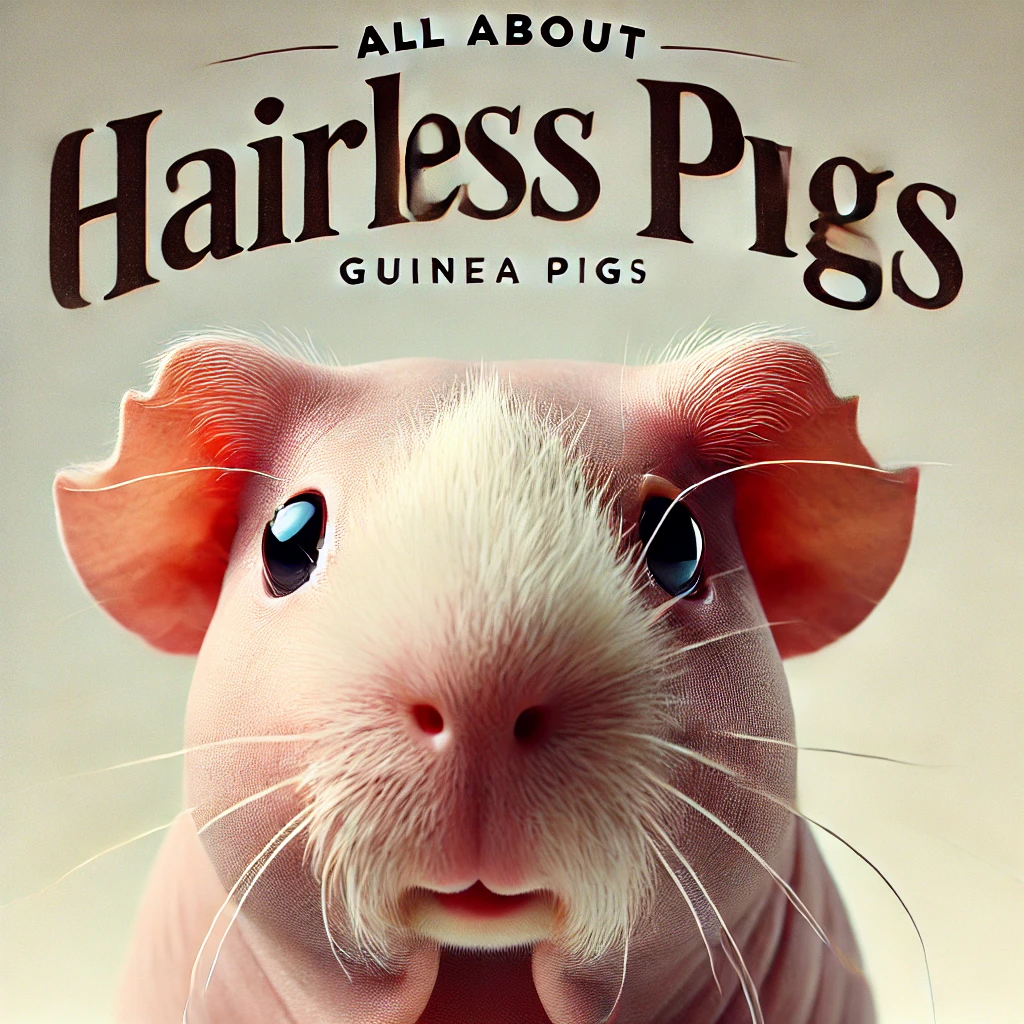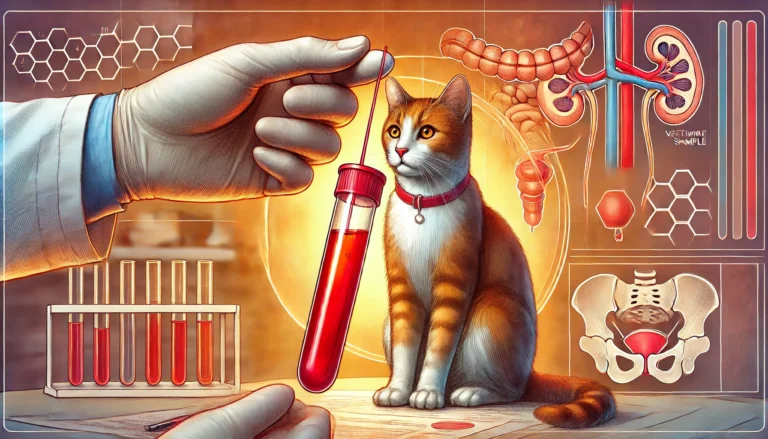Hairless Guinea Pig

The Ultimate Guide to Care, Breed, and Unique Characteristics
Introduction
Have you ever seen a hairless guinea pig? These unique creatures, also known as Skinny Pigs or bald guinea pigs, are one of the most distinctive pets you can own. Whether you’re a seasoned guinea pig owner or considering adopting your first, this comprehensive guide will provide you with everything you need to know about caring for these hairless wonders.
1. Understanding Hairless Guinea Pigs
Hairless guinea pigs come in several varieties, with the most popular being the Skinny Pig and the Baldwin Guinea Pig. Despite their different origins, both types lack the fluffy fur that characterizes most guinea pigs. Instead, they have smooth, exposed skin that makes them quite sensitive to environmental factors.
2. The Origins of the Hairless Guinea Pig
The hairless guinea pig is not a natural phenomenon but a result of genetic engineering. Skinny pigs were first developed in the 1970s in laboratories for dermatological studies. Meanwhile, the Baldwin guinea pig originated from a spontaneous genetic mutation in a litter of White Crested guinea pigs. These hairless cavies have since found their way into the hearts and homes of pet lovers around the world.
3. Physical Characteristics and Varieties
Hairless guinea pigs, often referred to as skinny pigs or hairless cavies, can weigh between 700 to 1200 grams. Their lifespan is typically five to seven years, though with exceptional care, some may live longer. Their skin can come in a variety of colors and patterns, just like haired guinea pigs. Varieties include the pure hairless Skinny Pig and the Baldwin, which loses its hair over the first few months of life.
4. Caring for Hairless Guinea Pigs
Caring for a skinny pig or any hairless guinea pig requires special attention, especially when it comes to their environment and skin care.
do you know
Hot Spots, also known as acute moist dermatitis, are one of the most common skin conditions in dogs, characterized by rapid onset and the potential for quick spread.
4.1 Temperature and Housing
One of the most critical aspects of hairless guinea pig care is maintaining the right temperature. These pets lose body heat quickly, so it’s important to keep their living environment warm and draft-free. Ideal temperatures range from 72 to 79 degrees Fahrenheit. Bedding should be soft and warm, such as fleece, to prevent hypothermia and skin abrasions.
4.2 Diet and Nutrition
Just like their furry counterparts, hairless guinea pigs thrive on a diet rich in fiber. Timothy hay should make up the bulk of their diet, supplemented by vitamin C-rich vegetables and pellets. Since they cannot produce vitamin C on their own, ensuring an adequate intake is crucial to prevent scurvy.
The exposed skin of a skinny guinea pig is susceptible to injuries, irritations, and infections. Regular vet check-ups are essential, and owners should monitor their pets’ skin closely for any signs of distress. Conditions like dry skin or ringworm are more prevalent in hairless breeds. Additionally, because they lack fur, sunscreen may be necessary if they are exposed to direct sunlight.
5. Ethical Breeding Practices
Breeding hairless guinea pigs should always be done responsibly and ethically. Prospective breeders must understand the genetic factors involved, particularly the recessive genes that cause hairlessness. Ethical breeding practices ensure the health and well-being of both the parents and the offspring.

6. Common Questions About Hairless Guinea Pigs
- How much do hairless guinea pigs cost? The price of a hairless guinea pig can vary depending on the breeder, location, and the pig’s coloration and health. Generally, they are more expensive than their haired counterparts.
- Are hairless guinea pigs hypoallergenic? Despite their lack of hair, hairless guinea pigs can still produce allergens through their saliva and dander.
- What are the best conditions for hairless guinea pigs? They thrive in warm, stable environments with plenty of space to explore and a diet rich in fiber and vitamin C.
7. Where to Find Hairless Guinea Pigs
If you’re looking to adopt a hairless guinea pig, check local rescues and shelters first. Some specialized breeders also offer hairless guinea pigs for sale, but it’s crucial to ensure they practice ethical breeding. Online resources and social media groups can also be helpful in connecting you with available pets.
Conclusion
Hairless guinea pigs are charming and unique pets that can bring a lot of joy to your home. However, they do require more care than their furry counterparts, particularly when it comes to their sensitive skin and the need for a warmer environment. With the right care, these bald beauties can make delightful, affectionate companions for years to come. Whether you choose a Skinny Pig or a Baldwin, the hairless guinea pig is sure to capture your heart with its unique appearance and lively personality.
Are hairless guinea pigs good pets?
Hairless guinea pigs, often called Skinny Pigs, make wonderful pets, especially for those looking for a unique companion. They have charming personalities, enjoy interacting with their owners, and are generally affectionate. Because of their lack of fur, they are ideal for individuals who may have allergies to fur-bearing pets, though they do still produce some dander. However, their hairlessness also means they require extra care compared to their furry counterparts. They are more sensitive to temperature changes, so keeping their environment warm and comfortable is essential. Additionally, they need a balanced diet rich in vitamin C and protection against skin issues like dryness or sunburn. Hairless guinea pigs are social animals and thrive when given attention, making them excellent pets for people who can dedicate time to social interaction. Overall, with the right care and setup, a hairless guinea pig can make a lovable and unique pet, full of personality and warmth.
How much does a hairless guinea pig cost?
The cost of a hairless guinea pig varies widely depending on factors like the breeder, location, and demand. Generally, hairless guinea pigs are more expensive than their furry counterparts due to their unique appearance and breeding requirements. On average, a hairless guinea pig can cost anywhere from $50 to $150, with some specialty breeders charging even more for rare colorations or pedigree Skinny Pigs. Additionally, costs associated with their care should be considered, as they often require more attention and specific housing conditions to keep them comfortable and healthy. Since they lack fur, they need warmer habitats and skin care products to avoid dryness and irritation, which can add to the overall expense. Adopting from a shelter or rescue group might be a more affordable and ethical option for obtaining a hairless guinea pig, but it’s essential to research and ensure the pet’s health and well-being regardless of its initial price.
Do hairless guinea pigs like to be held?
Yes, hairless guinea pigs generally enjoy being held, especially once they become familiar with their owners. These affectionate creatures are social and often thrive on human interaction. They recognize their caretakers and can be quite affectionate, even vocalizing with squeaks and chirps when they’re happy or excited. Because they lack fur, they tend to enjoy the warmth from human contact, which can feel comforting to them. However, their skin is sensitive, so handling them requires a gentle touch. Holding sessions should be done in a calm and quiet environment to avoid stressing them out. Introducing handling gradually and gently can help build trust, making the guinea pig feel secure and loved. With regular, gentle handling, hairless guinea pigs can become wonderful, affectionate companions that enjoy snuggling and interacting with their humans.
How long do hairless guinea pigs live?
Hairless guinea pigs have an average lifespan of five to seven years, similar to other guinea pig breeds. Their longevity can be influenced by factors such as diet, environment, and healthcare. Unlike their furry counterparts, hairless guinea pigs need warmer, more controlled environments, as they are more susceptible to temperature fluctuations and skin conditions due to their lack of fur. A balanced diet rich in vitamin C, regular vet check-ups, and a stress-free habitat can help them live a full life. Proper care also includes preventing skin issues, such as dryness and irritation, by ensuring they are not exposed to direct sunlight for prolonged periods. While hairless guinea pigs may require a bit more attention to maintain optimal health, a well-cared-for Skinny Pig can be a delightful companion for many years.
Can hairless guinea pigs live alone?
While hairless guinea pigs can technically live alone, it’s not ideal for their social needs. Guinea pigs are naturally social animals that thrive in the company of others. Hairless guinea pigs, like all guinea pig breeds, benefit greatly from companionship and are generally happier when they have a fellow guinea pig to interact with. Without a companion, they may experience loneliness and stress, which can lead to health issues. However, if keeping multiple guinea pigs isn’t possible, it’s essential to provide your hairless guinea pig with ample social interaction, playtime, and attention to compensate. Many owners who keep a single guinea pig will spend extra time with them daily to keep them engaged. Ultimately, hairless guinea pigs are happier and healthier when they have company, but if they must live alone, dedicated owner interaction is crucial.
What do hairless guinea pigs eat?
Hairless guinea pigs have dietary needs similar to their furry counterparts, requiring a diet rich in fiber and vitamin C to maintain health. The foundation of their diet should be high-quality Timothy hay, which aids digestion and keeps their teeth healthy. Fresh vegetables, especially leafy greens like kale, bell peppers, and parsley, provide essential nutrients and vitamin C, which guinea pigs cannot produce on their own. Specialized guinea pig pellets fortified with vitamin C should also be included in their daily intake. Fresh fruits, such as apples or berries, can be offered occasionally as treats but should be limited due to high sugar content. Fresh water should always be available, and regular dietary variety helps maintain their interest in food. A balanced diet tailored to their specific needs is essential for their overall health and well-being.
Should I bathe my skinny pig?
Bathing a Skinny Pig, or hairless guinea pig, should be done sparingly and only when necessary. Unlike their furry counterparts, hairless guinea pigs do not require regular baths, as frequent washing can dry out their sensitive skin. If your Skinny Pig does get dirty, a gentle wipe-down with a damp, soft cloth can usually suffice. However, if a bath is unavoidable, use lukewarm water and a mild, guinea pig-safe shampoo specifically formulated for sensitive skin. Avoid getting water into their ears and keep bath time short to prevent chilling. After bathing, thoroughly dry them with a soft towel and keep them warm. Over-bathing can strip natural oils from their skin, leading to irritation, so it’s best to limit baths and focus on maintaining a clean living environment to keep them fresh.
Can hairless guinea pigs eat bananas?
Yes, hairless guinea pigs can eat bananas, but only in moderation. Bananas are high in sugar and can lead to weight gain and digestive issues if consumed frequently. As an occasional treat, bananas offer a good source of potassium and vitamin C, which can benefit guinea pigs. A small slice once a week is sufficient to avoid any potential health issues related to overconsumption of sugar. When feeding bananas, make sure they are ripe and fresh, as unripe bananas may be hard for guinea pigs to digest. Always introduce new foods gradually and observe for any adverse reactions. While bananas can be a delightful snack for your hairless guinea pig, their diet should primarily consist of hay, pellets, and fresh vegetables to meet their nutritional needs effectively.
Is A guinea pig Smarter Than A Cat?
Comparing guinea pigs to cats in terms of intelligence is challenging, as each species exhibits intelligence in ways suited to its natural behaviors and survival needs. Cats are predators with problem-solving skills, strong memory, and an ability to learn through observation, making them adept at activities like hunting. Guinea pigs, on the other hand, are prey animals and rely on social intelligence and environmental awareness to stay safe. They are capable of learning their names, recognizing their owners, and even learning basic commands and routines, which speaks to their intelligence in their own unique way. While guinea pigs may not be as complex in their intelligence as cats, they have their own ways of showing awareness, memory, and learning, especially in social settings.
Do hairless guinea pigs smell?
Hairless guinea pigs do not have a strong natural odor. However, their living environment and diet can contribute to occasional odors if not properly maintained. Unlike some animals, guinea pigs have minimal body odor, but because hairless guinea pigs lack fur, they might be more prone to collecting dirt and oils on their skin, which could lead to mild smells if not regularly cleaned. Providing clean, soft bedding, maintaining a tidy cage, and offering fresh food and water daily can help minimize any odors. Hairless guinea pigs also benefit from a periodic wipe-down with a damp cloth to remove dirt and excess oils. A clean environment ensures your Skinny Pig remains odor-free and comfortable.
Can I hug my guinea pig?
Yes, guinea pigs generally enjoy gentle handling, and you can “hug” them in a way that feels comfortable and safe for them. However, it’s essential to approach them calmly, as sudden movements can cause stress. Start by holding them securely yet gently, ensuring they feel supported around their chest and bottom. Avoid squeezing, as guinea pigs are delicate and can easily become frightened or injured. Some guinea pigs might enjoy snuggling against you, as they appreciate warmth and security, but always pay attention to their body language. If they seem relaxed and content, a gentle hug-like hold can be a pleasant experience for both you and your pet. Just be mindful of their comfort and handle them carefully.
What do guinea pigs fear the most?
Guinea pigs are naturally cautious animals and are most fearful of loud noises, sudden movements, and unfamiliar scents. Being prey animals, they are highly attuned to potential threats, which can make them easily startled. Common fears include predatory animals, loud household appliances, and quick movements from people or other pets. It’s essential to create a calm and stable environment for guinea pigs, where they feel secure and can easily hide if they feel threatened. Providing hideouts in their cage helps them feel safe, and avoiding abrupt noises around them can minimize stress. Building trust with gentle interactions and a predictable routine can help alleviate some of their natural anxieties.
Do guinea pigs notice one dies?
Yes, guinea pigs are highly social animals and often notice when a companion passes away. They may exhibit signs of grief or distress, such as searching for their lost friend, vocalizing more frequently, or showing a decrease in appetite. Because guinea pigs form close bonds, losing a companion can be an emotional experience for them. If a guinea pig shows signs of depression after a loss, providing extra attention, interaction, and perhaps even introducing a new companion when they are ready can help them cope. Observing and comforting them during this time can support their emotional well-being.
Can I leave my guinea pig alone for 2 days?
It’s generally not advisable to leave a guinea pig alone for two days without supervision. Guinea pigs need fresh food, water, and a clean environment daily. Additionally, they are social animals and can become stressed or lonely without interaction. If you need to be away, consider arranging for a trusted friend or pet sitter to check on them daily to replenish food and water, clean the cage if needed, and provide companionship. Automated feeders and water bottles may help temporarily, but nothing substitutes for human supervision. For their health and happiness, ensure someone can attend to their needs during your absence.






